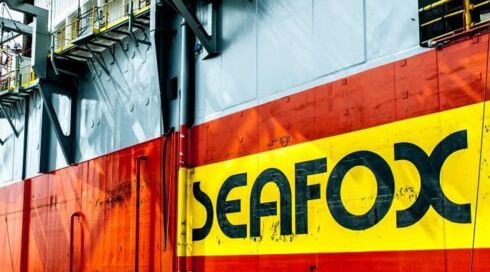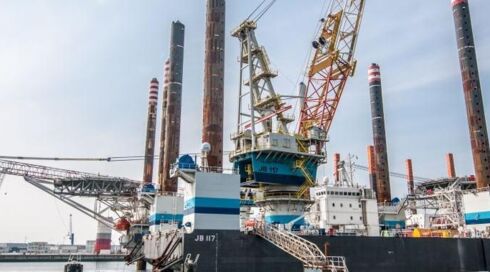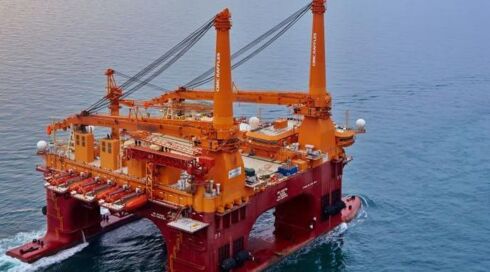3
For the last 40 years, Norwegian Thorun Watne has dedicated her life to providing help & support as a Radio operator in merchant shipping and on offshore platforms. Since 1998, Thorun has been working on oil rigs in the Norwegian sector. Thorun talks to Atlas about her career and how this male dominated industry has changed its views on women working offshore.
Keeping Track of Personnel
“My goal was to see the world: my Ma used to tell me that she couldn’t afford to pay for all the places that I wanted to see, so she suggested that I find a job where I could travel and that’s how it all started.”
Thorun’s role on the rig concerns scheduling flights, accommodation and calling in the emergency units for the platform, “We have 120 people onboard and I am their travel agent, I book the helicopters, check the personnel in and make sure that they have their luggage before boarding. It’s very important for me not to make any mistakes in case of an emergency; it would be a disaster if the rescue units are searching for personnel that are no longer onboard.”
Although the rig holds two beds to a cabin, new regulations on sleeping arrangements in have been put in place to those who are working in the Norwegian sector. “You must have one person in the cabin at a time, one during the day and one during the night,” explains Thorun. “This is often difficult as there are many changes during an offshore period. Sometimes a job demands a dayshift, but because of the bed situation, some rooms also need to be occupied during the day. It’s incredibly busy all the time on this platform and you have to pay attention.”
The Art of Staying Alive
“All offshore personnel are required to complete underwater escape training, which is one of the more energetic courses that I’ve had to partake in. When a helicopter hits the water it’s likely that it will turn upside down. We are trained to unfasten our seatbelt, grab the window ledge and pull ourselves out. We will be wearing a survival suit that fills up with air and allows us to float to the surface. Luckily I’ve never experienced a real emergency situation such as this. In this line of work it’s all about staying alive and returning home with no injuries.”
A Working Woman Offshore
Since starting her career in 1971, Norway’s offshore industry mainly consisted of male personnel, Thorun explains how the industry’s views on women working offshore has changed throughout the years. “I have worked in the offshore industry all my life, and I’ve never had the misfortune of someone telling me that I can not do my job because I am a woman.
The only incident that I had which concerned my sex was when I was applying for my first job offshore in 73. This man was laughing at me. I asked him, what’s so funny? He said that there were no female showers or WCs on offshore rigs. I had already been working in merchant shipping for a couple of years and I told him that surely this wasn’t a problem as I could just put a sign on the door saying that it was occupied. He kept laughing and said that I couldn’t do this as women weren’t allowed to work on rigs at the time; it was too early for females to be in this industry.
Although this is a masculine industry, it’s a good world for women to get involved in as they change the status quo on the vessel. Women are equal to men in the offshore industry, they focus on the job at hand and co-operate in a team.
The only difference may be that women are better behaved,” laughs Thorun. “We have many women right now working on the rig; there are engineers, caterers and on some other rigs in Norway there are female OIMs. We’ve also had female executives in the Norwegian sector, so it just shows you how much has changed.
I think another factor that can define you in this industry is where you work. Again I remember when I first started out in the industry and my grandma asked me whether it was difficult working only with men. I just told her that it wasn’t difficult as people on a vessel will treat you with more respect than others working on the beach. I believe this is true because you build a close relationship with your colleagues offshore; for a certain amount of weeks they are the closest thing you have to family.”
Forming Life-Long Friendships
“I find this to be one of the more difficult challenges, saying goodbye to your colleagues after working with them for so long. We have a quick handover on deck, so when the old crew leaves, you only have a second to say a proper goodbye and greet the new personnel onboard. It can be quite emotional as you form friendships through your colleagues and become dependant on them. I picture it as if we were all lying in the water with our survival suits on. In order to stay alive and be rescued, we have to tie ourselves together. With all our orange suits close together we’re more visible for the rescue teams to spot us; we are all in the same boat so if we work as a team we can keep each other alive.”
Thorun goes on to explain how the rig will be celebrating Norway’s Constitution Day in a few days time. All personnel onboard will be dressed in the colours of the Norwegian flag and the whole country will be celebrating their traditions and the royal family.
An Advocate for the Offshore Industry
Although the offshore industry is still mainly male dominated, Thorun has become an advocate for all women who want to develop a career in this market. “I would say to anyone that wanted to work in the offshore industry that you have a great job ahead of you. In an environment such as this, the friendships you build are stronger and are worth saving.”
.png)
.png)


